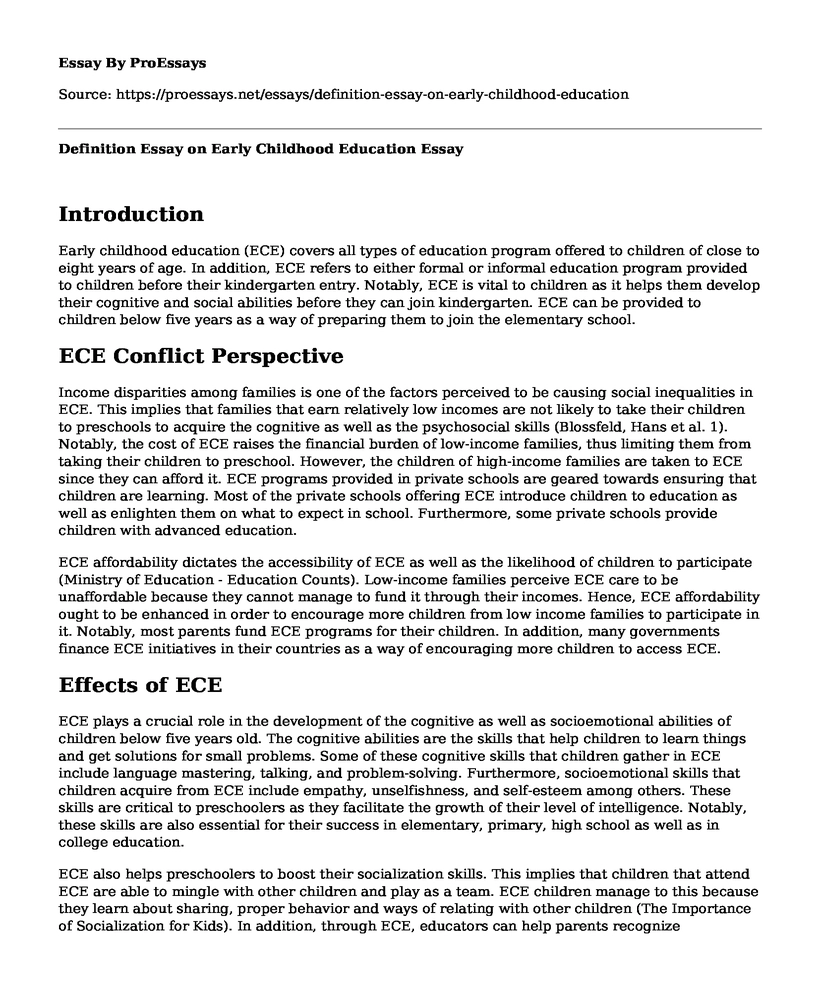Introduction
Early childhood education (ECE) covers all types of education program offered to children of close to eight years of age. In addition, ECE refers to either formal or informal education program provided to children before their kindergarten entry. Notably, ECE is vital to children as it helps them develop their cognitive and social abilities before they can join kindergarten. ECE can be provided to children below five years as a way of preparing them to join the elementary school.
ECE Conflict Perspective
Income disparities among families is one of the factors perceived to be causing social inequalities in ECE. This implies that families that earn relatively low incomes are not likely to take their children to preschools to acquire the cognitive as well as the psychosocial skills (Blossfeld, Hans et al. 1). Notably, the cost of ECE raises the financial burden of low-income families, thus limiting them from taking their children to preschool. However, the children of high-income families are taken to ECE since they can afford it. ECE programs provided in private schools are geared towards ensuring that children are learning. Most of the private schools offering ECE introduce children to education as well as enlighten them on what to expect in school. Furthermore, some private schools provide children with advanced education.
ECE affordability dictates the accessibility of ECE as well as the likelihood of children to participate (Ministry of Education - Education Counts). Low-income families perceive ECE care to be unaffordable because they cannot manage to fund it through their incomes. Hence, ECE affordability ought to be enhanced in order to encourage more children from low income families to participate in it. Notably, most parents fund ECE programs for their children. In addition, many governments finance ECE initiatives in their countries as a way of encouraging more children to access ECE.
Effects of ECE
ECE plays a crucial role in the development of the cognitive as well as socioemotional abilities of children below five years old. The cognitive abilities are the skills that help children to learn things and get solutions for small problems. Some of these cognitive skills that children gather in ECE include language mastering, talking, and problem-solving. Furthermore, socioemotional skills that children acquire from ECE include empathy, unselfishness, and self-esteem among others. These skills are critical to preschoolers as they facilitate the growth of their level of intelligence. Notably, these skills are also essential for their success in elementary, primary, high school as well as in college education.
ECE also helps preschoolers to boost their socialization skills. This implies that children that attend ECE are able to mingle with other children and play as a team. ECE children manage to this because they learn about sharing, proper behavior and ways of relating with other children (The Importance of Socialization for Kids). In addition, through ECE, educators can help parents recognize behavioural as well as intellectual incapacities that children may be facing. ECE educators manage to identify these challenges by monitoring the behavior of different children as they socialize with others.
Furthermore, ECE allow children to learn different language skills from their association with their educators and other children. Moreover, the ECE facilities have a curriculum on language learning in their timetable, which allows children to develop their verbal skills. Some of the activities that ECE children indulge in building their language skills include storytelling, reciting poems, acting, among others.
Works Cited
Blossfeld, Hans-Peter, et al., eds. Childcare, early education and social inequality: An international perspective. Edward Elgar Publishing, 2017.
"The Importance of Socialization for Kids." Children's Campus, 11 Aug. 2015, childrenscampus.com/blog/importance-socialization-kids/.
"Ministry of Education - Education Counts." Affordability of Early Childhood Education, www.educationcounts.govt.nz/statistics/archived/ece2/ece-indicators/56004.
Cite this page
Definition Essay on Early Childhood Education. (2022, Mar 15). Retrieved from https://proessays.net/essays/definition-essay-on-early-childhood-education
If you are the original author of this essay and no longer wish to have it published on the ProEssays website, please click below to request its removal:
- Same-Sex Schools Essay Example
- Essay on Lessons from Preschool Observation
- American College of Sports Medicine Paper Example
- Paper Example on Mediating Effect of the Commitment of Teachers
- Essay Sample on Virtual and Online Learning
- Paper Example on Fairy Tales: A Lesson Plan for Improving Reading and Listening Skills
- Paper Example on Senior Accountant CPA/CMA: Pro Skills, Aptitude & Professionalism







